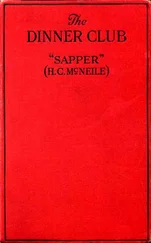“ ‘Supposing that had happened, it would be better for her to say so at once,’ I said.
“ ‘But it didn’t happen,’ he answered; ‘it couldn’t have.’
“ ‘No,’ I agreed. ‘It didn’t happen; it couldn’t have. But supposing it had, Sir Edward, what then?’
“ ‘Stop, Stratton,’ he cried. ‘For Heaven’s sake, stop!’
“ ‘There’s no good stopping,’ I said. ‘We haven’t any time for argument. Your legal knowledge has suggested the same solution as occurred to me. If now, at once, when we send for the police, she says it was an accident—gives a complete story, chapter and verse——’
“ ‘Invents it, you mean,’ he interrupted.
“ ‘Call it what you like,’ I said, ‘but, unless she does that and substantiates the story, she will be tried for the premeditated and wilful murder of her husband. She’ll have to be tried anyway, but if she makes a voluntary confession—makes a story out of it that will appeal to sentiment—they will acquit her. It’s the only chance.’
“ ‘But it’s monstrous, man,’ he muttered—only now his eyes were fixed on me questioningly.
“ ‘Look here, Sir Edward,’ I said, ‘let’s discuss this matter calmly. Humanly speaking, we know what happened. Ruth came along that passage, opened this door, and shot her husband dead through the heart—that is the case as I should put it to the jury, the plain issue shorn of all its trappings. What is going to be the verdict?’
“Shoreham plucked at his collar as if he were fighting for breath.
“ ‘If, on the other hand, the shot was not immediate—and I am the only witness as to that; if I had heard his voice raised in anger; if he had sprung at her, tried to kiss her, and she blindly, without thought, had snatched up the first thing that came to her hand, the revolver, not even knowing it was loaded—what then? The servants can be squared. She was talking wildly when she mentioned this man—didn’t know what she was saying. And then, when she got back to her room she realised that the truth was best, and rang you up, a Judge. What better possible proof could any jury have of her desire to conceal nothing? And you with your reputation on the Bench——’
“ ‘Ah, don’t, don’t!’ he cried hoarsely. ‘You’re driving me mad! You’re—you’re——!’
“ ‘Why, Ned, what’s the matter?’
“We both swung round. Ruth had come in, unnoticed by us, and was staring at Shoreham with wonder in her eyes. Then, with a shudder, she stepped past her husband’s body and came into the room.
“ ‘They’ve just told me you were here,’ she said, and then she gave a little cry. ‘Ned, why are you looking like that? Ned! you don’t think—you don’t think I did it?’
“She cowered back, looking first at him and then at me.
“ ‘You can’t think I did it,’ she whispered. ‘I tell you there was a man here—the man who shot him. Oh! they’ll believe me, won’t they?’
“ ‘Ruth,’ I said, ‘I want you to realise that we’re both of us your friends.’ Which is the sort of fatuous remark one does make when the tension is a bit acute. She never even glanced at me as I spoke; with a sort of sick horror in her eyes, she was staring at Shoreham, and I blundered on: ‘When you talked about this man you were unnerved—distraught; you didn’t know what you were saying. We both realise that. But now we’ve got to think of the best way of—of helping you. You see, the police must be sent for—we ought to have sent for them sooner—and——’
“She walked past me and went over to Shoreham.
“ ‘Do you believe I did it, Ned?’ she said quietly. ‘If I swear to you that I didn’t—would that convince you?’
“ ‘But, Ruth,’ he cried desperately, ‘it isn’t me you’ve got to convince—it’s the police. A man couldn’t have got out of that window in the time. It’s a physical impossibility. If you told it to the police, they’d laugh. Tell us the truth, my dear. I beseech you. Tell us the truth, and we’ll see what can be done.’
“She stood very still, with her hands clenched by her sides. And then quite deliberately she spoke to Shoreham.
“ ‘If you don’t believe there was a man here,’ she said, ‘you must think I shot my husband. There was no one else who could have done it. Well—supposing I did. You acknowledge no justification for such an act?’
“I started to speak, but she silenced me with an imperative wave of her hand.
“ ‘Please, Bill——Well, Ned—I’m waiting. If I did shoot him—what then?’ ”
The Barrister paused to relight his cigar, and the others waited in silence.
“She was staring at Shoreham,” he went on after a while, “with a faint, half-mocking, wholly tender smile on her lips, and if either he or I had been less dense that smile should have made us think. But at the moment I was absorbed in the problem of how to save her; while she was absorbed in a very different one concerning the mentality of the man she cared for. And Shoreham—well, he was absorbed in the old, old fight between love and duty, and the fierceness of the struggle was showing on his face.
“There in front of him stood the woman he loved, the woman who had just shot her husband, and the woman who was now free for him to marry. He knew as well as I did that in adopting the line I had suggested lay the best chance of getting her acquitted. He knew as well as I did that the vast majority of juries would acquit if the story were put to them as we had outlined it. He could visualise as well as I the scene in court. Counsel for the defence—I’d already fixed on Grayson in my mind as her counsel—outlining the whole scene: her late husband’s abominable conduct culminating in this final outrage at her reception. And then as he came to the moment of the tragedy, I could picture him turning to the jury with passionate sincerity in his face—appealing to them as men—happily married, perhaps, but men, at any rate, to whom home life was sacred.
“I could hear his voice—low and earnest—as he sketched for them that last scene. This poor, slighted, tormented woman—girl, gentlemen, for she is little more than a girl—went in desperation to the man—well, he is dead now, and we will leave it at that—to the man who had made her life a veritable hell. She pleaded with him, gentlemen, to allow her to divorce him—pleaded for some remnant of decent feelings in him. And what was his answer—what was the answer of this devil who was her husband? Did he meet her half-way? Did he profess the slightest sorrow for his despicable conduct?
“No, gentlemen—not one word. His sole response was to spring at her in his drunken frenzy and endeavour to fix his vile attentions on her. And she, mad with terror and fright, snatched up the revolver which was lying on the desk. It might have been a ruler—anything; she was not responsible at the moment for what she did. Do you blame her, gentlemen? You have daughters of your own. She no more knew what she had in her hand than a baby would. To keep him away—that was her sole idea. And then—suddenly—it happened. The revolver went off—the man fell dead.
“What did this girl do, gentlemen, after that? Realising that he was dead, did she make any attempt to conceal what she had done—to conceal her share in the matter? No—exactly the reverse. Instantly she rang up Sir Edward Shoreham, whose views on such matters are well known to you all. And then and there she told him everything—concealing nothing, excusing nothing. Sir Edward Shoreham of all people, who, with due deference to such a distinguished public man, has at times been regarded as—well—er—not lenient in his judgments. And you have heard what Sir Edward said in the box. . . .”
Читать дальше












